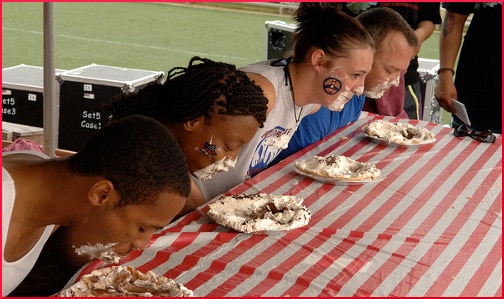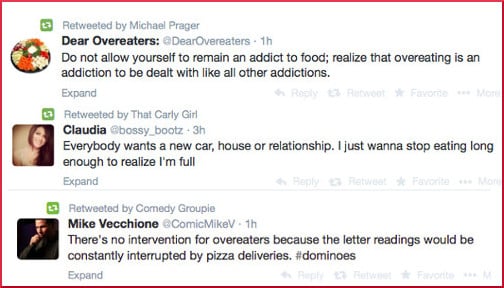Relationship Between Food Addiction and BED

Whether compulsive eating is a substance addiction or a behavioral addiction, the results are pretty much the same: obesity and assorted co-morbidities.
The Food Addiction — Eating Addiction Quandary

Do you eat because you are depressed, or the other way around? High-fat foods can cause chemical reactions in the brain ultimately leading to depression.
Food Addiction vs. Eating Addiction

Those who want to lose weight would have to shed old eating habits. Eating is a behavior, and behavioral addictions are amenable to behavioral therapy.
RDoC and the Future of Food Addiction and Eating Disorders

It becomes more and more evident that all addictions are one. Apparently, whichever addictogenic behavior or substance gets to a person first will lay claim to an addiction-prone person, and if that addiction is ostensibly cured, another one will step up to take its place. (The illustration above is of the mythical Hydra. Cut off one […]
Food Addiction: Alternate Diagnoses

Here is the confluence of two trains of thought. The first concerns the omission of food addiction from the 5th edition of the Diagnostic and Statistical Manual of Mental Disorders. The other is the quality of life experienced by an obese child – not as a result of the obesity, but beforehand. Not just the […]
How was Food Addiction Left Out?

As Childhood Obesity News has discussed before, the latest edition of the Diagnostic and Statistical Manual managed to omit recognition, in any way, shape, or form, of the reality of food addiction. What causes this ongoing delay? The medical establishment in Great Britain, as in other places, seems to have made up its mind. For […]
When the Food Addiction Concept Caught On

Recently, Childhood Obesity News looked at a fascinating study in which alternative high school students – with at least one behavioral “strike” against them – were interviewed three years after going through a drug abuse prevention project. The researchers were curious about multiple addictions in the young. One reason why this phenomenon has not been […]
Adrian Meule Forges Ahead Studying Food Addiction

As a doctoral student at the University of Würzburg in Germany, Adrian Meule was influenced by Dr. Pretlow’s “Addiction to Highly Pleasurable Food as a Cause of the Childhood Obesity Epidemic: A Qualitative Internet Study” in Eating Disorders: The Journal of Treatment & Prevention. Meule advocated using the Yale Food Addiction Scale (YFAS) as a […]
The Food Addiction Institute Viewpoint

Last time, Childhood Obesity News referenced a quotation by Dr. Vera Tarman to the effect that Binge Eating Disorder (BED) is related to “what is eating you” (emotional and psychological problems). In food addiction, “what you are eating” is the villain (highly processed food-like substances laced with chemicals and oodles of hidden sugar). The person […]
The Maladaptivity of Food Addiction

In an essay describing how people use food to cope with emotional problems, Elizabeth Hartney outlined some resemblances: There are several similarities between food addiction and drug addiction, including effects on mood, external cues to eat or use drugs, expectancies, restraint, ambivalence, and attribution. Neurotransmitters and the brain’s reward system have been implicated in food […]
